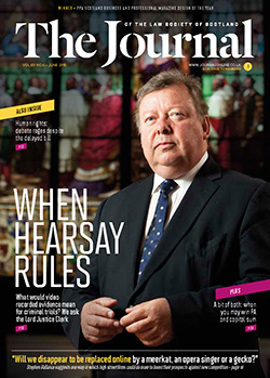Perils of the owner-occupied croft

Section 19D(6) of the Crofters (Scotland) Act 1993, as amended, is very clear: “Any transfer of ownership of any part of an owner-occupied croft which is not a new croft created by a division under this section, and any deed purporting to transfer ownership of that part, is null and void.”
It appears to be one of the few examples where crofting law trumps Scots property law. Or does it? The answer is not straightforward. It depends not just on whether the deed in question is registered in the Land Register or the Register of Sasines, but also on whether the deed was registered before 8 December 2014, when the Land Registration (Scotland) Act 2012 came into effect. This article explores the consequences of the 2012 Act in the context of the division of crofts by owner-occupier crofters.
Pre-December 2014 position
The Land Registration (Scotland) Act 1979 created a “positive” system of land registration. In a radical departure from the principles of Scottish property law, it invested faith in the integrity of the new map-based public register. As a result, void titles (including deeds falling within s 19D(6)) became voidable through the process of land registration. Section 3 of the 1979 Act vested the registered proprietor with a real right, subject only to any matter entered into the title sheet and any overriding interests, of which the right of a crofter was one (1979 Act, s 28(1)). The Keeper was able to rectify the register against a “proprietor in possession” only in very limited circumstances, principally where there was an exclusion of indemnity or the inaccuracy had been caused “wholly or substantially by the fraud or carelessness of the proprietor in possession”.
In the instance of a s 19D(6) deed, the grantee would ordinarily be entered on the title sheet as the registered proprietor, without exclusion of indemnity. Usually the Keeper would not be aware of the fact that the deed inducing registration was void. In the absence of fraud or carelessness by the proprietor in possession, the registered title would be free from challenge. There would be very few instances where the proprietor in possession had caused the inaccuracy by fraud or carelessness.
Effect of the 2012 Act
The 2012 Act provides a rebalancing of the “positive” system of land registration to a more “negative” system. A s 19D(6) deed cannot (in most circumstances) be cured by registration, as property law deems such a deed to be void and of no effect. The Act overhauls the Keeper’s powers of rectification of the register. The slippery concept of a “proprietor in possession” is replaced with a duty on the Keeper to rectify the register where she becomes aware of a manifest inaccuracy (2012 Act, s 80(2)). The obligation to pay compensation is limited: there is no liability where the inaccuracy “is caused by some act or omission on the part of the claimant”.
Section 50(2) of the 2012 Act provides that registration of a valid deed transfers ownership. A s 19D(6) deed is not valid. Section 65 of the 2012 Act defines an inaccuracy as that which “misstates what the position is in law or fact”. Giving effect to a void deed, such as a s 19D(6) deed, would be a “manifest inaccuracy”. In the case of the s 19D(6) deed, it would also be manifest that the Keeper could rectify the register by amending the title sheet and entering the original owner as proprietor.
Even where the Keeper’s warranty has been provided, there would be no liability on the Keeper to compensate if the inaccuracy was, or ought to have been, known to the applicant or their solicitor. The fact that as 19D(6) deed is void should have been known at least to the solicitor, if not to the applicant. Where the inaccuracy is attributable to the failure of the applicant or their solicitor to comply with the duty of care in the 2012 Act, there is no liability to compensate. In most cases of the registration of a s 19D(6) deed, the Keeper will not compensate. In the event she does compensate the party against whom the register is rectified (usually the applicant), she may be able to recoup her losses – including legal costs – from the applicant or his solicitor.
A limited exception
An exception to the above rules, known as realignment, applies where a person (A), who is not a proprietor but who is entered in the title sheet as proprietor, purports to dispone land to B. A, or A and B, must possess the land peaceably and without judicial interruption for a continuous period of at least a year. B must be in good faith, and the Keeper must have warranted A’s title. This would apply where A is registered as proprietor on the basis of a s 19D(6) deed. Realignment, which is an exception to the “negative” nature of the new register, will assist only in the small number of cases where an owner-occupied croft is purportedly divided by way of a registered disposition, and such divided part is then disponed to a third party.
The 2012 Act provides cold comfort for a solicitor, or his or her client, who registers a void s 19D(6) deed. The duty of care set out in s 111 could have the effect of making the solicitor liable for the inaccuracy. A property lawyer who acts in connection with the sale and purchase of croft land should be wary of any deed purporting to transfer ownership of part of a croft.
In this issue
- Weighing the risks
- Private parking fines – are they enforceable?
- Scotland – home of (dangerous) golf
- Shareholder details: the right to refuse
- Perils of the owner-occupied croft (fuller version)
- Reading for pleasure
- Opinion: Thomas Ross
- Book reviews
- Profile
- President's column
- Land Register completion: one year in
- People on the move
- Rights: whose final say?
- The word on the street
- Screen test
- Making the best of mediation
- Keep up the payments
- The right priorities
- When reputation is not enough…
- Sports justice – being seen to be done?
- Source of disputes
- CML Handbook: the new deal
- Perils of the owner-occupied croft
- In-house and in-tune in the Commonwealth
- Stair Society seeks new blood
- New Build Standard Clauses revised
- Law reform roundup
- Leven's last hole rarely in benevolent mood
- Year of the new look
- AML just became simpler
- "My time is valuable!" Oh really?
- Learning opportunity
- Ask Ash
- Technology: slave or master?






